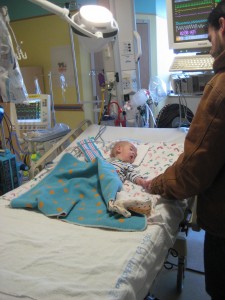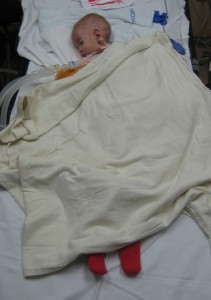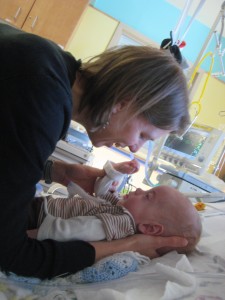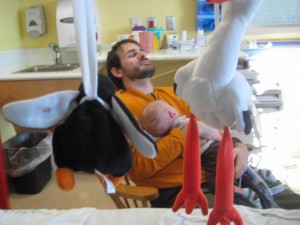Lucas’s return to the ICU has brought new challenges and mysteries for an already enigmatic little guy. In turns out that the level of sodium measured in Lucas’s blood Tuesday night in the ER was astonishingly low; in fact, a number of doctors have mentioned that they’ve never seen a human with such low sodium (or “hyponatremia”) who didn’t go into seizures. It wasn’t until yesterday afternoon that we realized how serious his condition was – the ER doctor hadn’t seemed very concerned when he told us that Lucas was going to need sodium supplements through an IV – and with that understanding came the realization that Lucas will probably be in the hospital for more than the 2 days we originally projected.
(or “hyponatremia”) who didn’t go into seizures. It wasn’t until yesterday afternoon that we realized how serious his condition was – the ER doctor hadn’t seemed very concerned when he told us that Lucas was going to need sodium supplements through an IV – and with that understanding came the realization that Lucas will probably be in the hospital for more than the 2 days we originally projected.
On Tuesday night Lucas’s sodium level was 104 milliequivalents per liter; the normal level is 135-140, and anything under 125 is considered very low. Since then the level has been climbing slowly and this morning we were relieved to hear that it was up to 129 meaning that he’s almost back to normal. The question of why he became hyponatremic in the first place remains a mystery. It turns out that according to the urine and blood cultures Lucas probably didn’t have a UTI when he came into the hospital, and vomiting 10-20 ml of the nearly 700 ml of milk he consumes a day is not enough to cause severe dehydration (which could in turn lead to low sodium levels). More specialists will visit in the next few days as the try to get to the bottom of Lucas’s latest mystery. The two of us have developed our own theories from Krista’s Anatomy and Physiology book along with some google research and we’re testing them out on the doctors, keeping up with them in conversations around whether the sodium imbalance is related to kidneys, hormones, brain injury, nutrition… or none of the above. (Incidentally, we apologize for using such technical medical terms sometimes but that’s what a couple days in an ICU will do to you.)
Regardless of the reason, the docs want to keep him in the hospital a few days – even after he stabilizes, is taken off the IV, and returns to normal feeds – in order to make sure that his sodium doesn’t drop precipitously once again. It’s tough to imagine how long this may have been occurring. Certainly hyponatremia is not something you read about in “Caring for Your Newborn”, and besides, there’s no part of our home arsenal of machines that includes a way to measure sodium levels. However, in going back through Lucas’s NICU discharge papers we remembered that he measured low electrolyte levels a few times (in particular sodium) and that the doctors had various hypotheses about why this was the case (we tried to hunt down our favorite neonatologist yesterday to talk to him more about it). So maybe we should have investigated the possibility of low sodium when Lucas began vomiting a couple weeks ago. Indeed, it may be that he’s been hyponatremic for weeks and that the vomiting was a result, and not cause, of low sodium levels. How could we have been so stupid!?!
But seriously, with Lucas back in the hospital we haven’t been getting much sleep, and there have once again been tough decisions to make about his treatment, sometimes with no clear answers. The hardest thing has been watching the nurses and doctors try to establish “access” to his system via an IV or central line. Lucas has small veins and arteries to begin with but the hyponatremia exacerbates the problem and makes it difficult for even the steadiest hand to get a line into his bloodstream. We watched for hours on Tuesday as overconfident pros tried to get a basic IV in Lucas (a young nurse who we looked at and doubted ended up getting the job done) and then struggled to see the doctors fail repeatedly at inserting a “central line” yesterday, which would have provided more secure access to the bloodstream. At midnight as they geared up to poke his jugular we grilled them about whether it was really necessary, and they eventually convinced us that it was. The doctors then tried and failed for over an hour until it was too much to bear and we told them to please let him rest. As it happened, his sodium level stabilized overnight without the central line and this morning they announced that it would no longer be necessary. We try not feel resentment towards them for the little scars on his neck and for the trauma he must have felt despite the sedation, but it’s hard. Such is life back in the hospital.
As hard as it is, we are also not losing sight of the potential for good things to come of this hospitalization. It is possible that the low sodium is an isolated problem, but it’s also possible that it gives us another piece to the overall puzzle of Lucas’s hypotonia. Which leaves room for the small hope that we could find a diagnosis we hadn’t looked for before. So we’re going to take advantage of being surrounded by smart people at the hospital — who we’d usually have to wait months to get an appointment with — and grill everyone who passes near our room.









